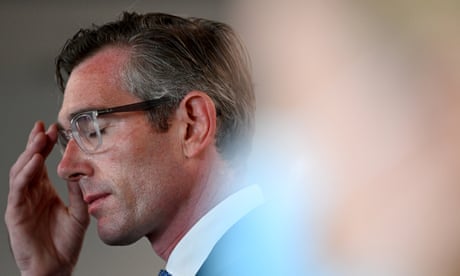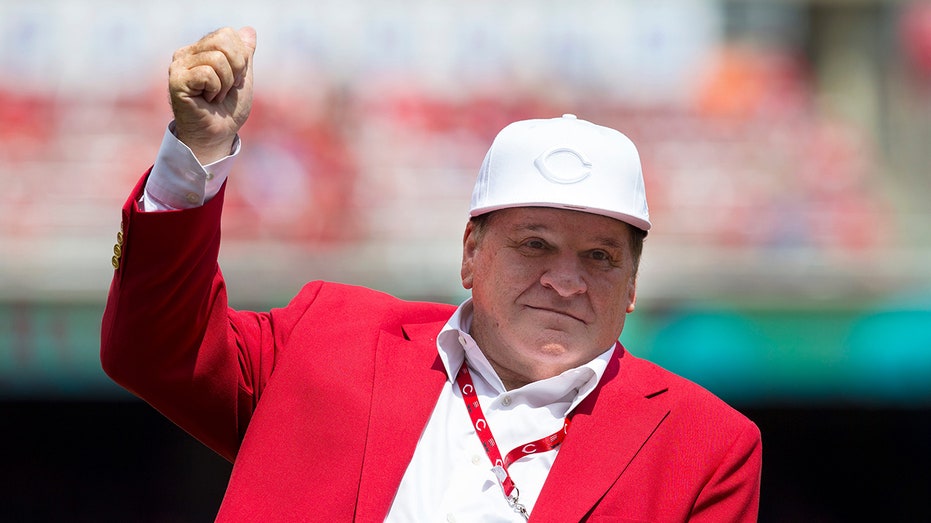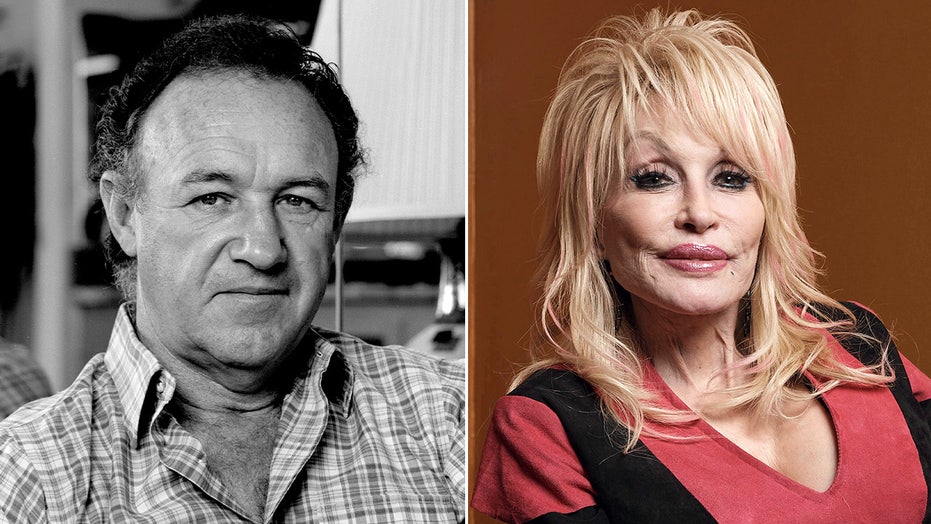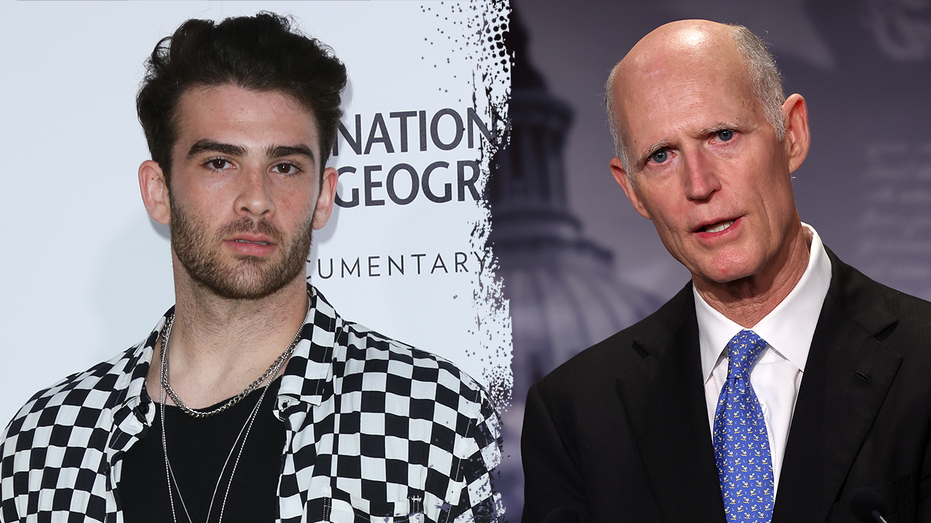- by foxnews
- 05 Mar 2025
‘He wanted to charge ahead and be the hero’: colleagues hope Dominic Perrottet has learned from backflips
‘He wanted to charge ahead and be the hero’: colleagues hope Dominic Perrottet has learned from backflips
- by theguardian
- 15 Jan 2022
- in news

In the second week of October, as New South Wales was emerging from a winter of stultifying Covid-19 lockdown, new premier Dominic Perrottet quickly set about positioning himself as the optimistic face of post-pandemic Australia.
Introducing himself to an electorate which had clung to the cautious leadership of Gladys Berejiklian like a security blanket during the Delta wave, the new premier did not seek to define himself as a business-as-usual replacement.
Instead, at a series of press conferences held in pubs across Sydney, Perrottet arrived as the beer drinking, freedom-loving leader determined to push Covid-19 off the front page by ushering in a new era of living with the virus.
The chief medical officer, Dr Kerry Chant, was notably sidelined, while the quarantine requirements for international arrivals, which had been a mainstay of Australia's Covid response, were quickly scrapped. In November, restrictions were further eased ahead of the scheduled roadmap set by Berejiklian before her departure.
"We can't live here in a hermit kingdom," Perrottet said on 15 October, announcing that NSW would re-open its borders.
"We've got to open up."
For a while, the cheerful crash-or-crash-through style worked. From the end of lockdown to early December, Covid cases remained stable in NSW, while the number of hospitalisations actually fell. On 8 December Perrottet gave a speech at the National Press Club in which he pushed for state and commonwealth reform "as we move beyond the pandemic".
By mid-December though, as the highly-contagious Omicron variant led to mounting case numbers, the equation began to change. This week, as the premier marked 100 days in office, he finds himself beset by mounting crises including a failing testing regime, an overwhelmed hospital system, supply chain shortages and a skyrocketing infection rate which ranks among the highest in the world.
Questions are now being asked about the government's direction since Berejiklian was forced to resign. Some senior ministers are increasingly nervous about a barrage of negative headlines facing the government just months after losing its biggest electoral asset, Berejiklian's personal popularity, and in the face of a series of byelections due in coming months.
This week the former NSW transport minister, Andrew Constance, who resigned to run for the Liberals in the federal seat of Gilmore, released a video on Facebook in which he called for "empathetic leadership" and urged the government to consider increased business support while "listening to Kerry Chant".
At the heart of the unease is the idea that in breaking away from what some perceived as Berejiklian's over-cautious approach, Perrottet may have pushed the needle too far in the opposite direction.
"The thing about Dom is he is a relentless optimist, he's a glass half-full person. That's actually a good thing, but it meant he wanted to charge ahead and be the hero who freed the state without fully thinking about the consequences," one senior MP told the Guardian this week.
"It's obvious the planning wasn't there to think about 'OK, cases aren't the main game but if cases do start to rise, what happens next?'"
That Perrottet had chafed at some of the Delta-era restrictions as treasurer was well-known. In July the Australian Financial Review reported he had suggested that Chant take a pay cut if Sydney was unnecessarily locked down at the beginning of the Delta wave, and multiple sources told the Guardian that throughout that period both he and his new deputy, Stuart Ayres, had been the most vocal proponents of economic considerations throughout the pandemic.
"Alarm bells should have been ringing in December and they weren't and I think that is just based on the personal attitude of Perrottet and Ayres," another senior NSW Liberal told the Guardian.
"They've been more focused on the economy throughout the pandemic and I'm not surprised we're seeing the numbers we are now because it's almost as if it's been an ideological approach to handling public health and you can't have that.
"I think the big change, the one that is being noticed in the community, is that Kerry Chant clearly hasn't been listened to in the way she had been through the first two years of the pandemic."
Later, when indoor mask-wearing rules were scrapped on 15 December, Chant pointedly distanced herself from the decision, calling it a "matter for government".
"All I'm saying is from a public health position I am strongly recommending we keep masks and I'm asking the community to do so," Chant said at the time.
Although case numbers have risen rapidly in most nations following the arrival of the Omicron strain, health experts say removing those measures made a difference. Prof Alexandra Martiniuk, an epidemiologist at the University of Sydney, told the Guardian a more cautious approach may have helped to delay the Omicron wave.
"I think it would have helped to flatten the curve so, you know, the wave still would have occurred but over a longer period of time," she said.
"Some people say, 'Great, it's better to get it done faster, it's like ripping off a Band-Aid', but in reality when it comes through quicker, more people die."
While there is unease within the government about the need for recent backflips on mask mandates and changes to restrictions on singing and dancing in bars, there is also a feeling that the global experience of booming Covid cases since the arrival of the Omicron variant show there is little Perrottet could have done to stem the tide. The finance minister, Damien Tudehope, a close ally of the premier, believes Perrottet has operated well while enduring a baptism of fire as a new leader, and points to the fact that both Victoria and Queensland have seen an explosion in Covid cases despite holding on to many of the restrictions Perrottet has been criticised for scrapping. Both those states also saw record case numbers and deaths this week.
"In the context he's found himself in a pandemic where you're making decisions every day of the week and everyone is a commentator; the difficulty any political leader has is you're under a significant microscope all of the time," Tudehope told the Guardian.
"I think a person who has been in the job a long time gets it a lot easier than someone who comes into it fresh because there is a history of decision making and the community knows what to expect, and you see that with Daniel Andrews or Annastacia Palaszczuk.
"Dom had no chance to establish that sort of familiarity with the electorate so he's being examined very closely."
Indeed, much of the criticism focused on Perrottet comes despite his bullish approach to living with the virus being mimicked by other Australian leaders.
Despite previously taking an ultra-cautious approach to Covid, the Labor government in Victoria is now virtually in lockstep with NSW, while Queensland has slowly been cajoled into dropping the border closures that divided the states for long stretches of the pandemic.
The commonwealth too has at times found itself scrambling to keep up with the new premier. When Perrottet announced in the middle of October that he would throw the international borders open, the prime minister, Scott Morrison, was left playing catch-up on the announcement.
"Dom's leadership has in many respects forced the prime minister and other jurisdictions to come along and join him," Tudehope said.
"In terms of decision making, the way he forced Morrison's hand in relation to overseas students, in one respect he had no real jurisdiction there but he forced Morrison's hand because he took the view that we have to reinvigorate the economy and rejoin the world.
"He leads the conversation and I think he recognises that not everyone will agree with him, but it shows he's got some mettle about him."
While there is an acceptance that the emergence of Omicron could not have been foreseen, critics of the government's response say pressures resulting from rising case numbers were predictable. The ongoing shortage of rapid antigen tests, even as the government seeks to make them a key plank of its Covid response; severe strain on the state's health system; and pressures on small businesses emanating from staff shortages caused by isolation orders have all added to a sense the government failed to adequately plan for a rise in case numbers.
"How can you build a system where you're turning people away from PCR tests and telling essential workers they must have rapid tests, but they're either too expensive or unavailable or both," the NSW opposition leader, Chris Minns, told the Guardian.
"I mean it's no wonder people are sitting at home saying 'what am I supposed to do?'. It seems like all the sacrifices people made at great personal cost are just being lost. No one expects the government to stop Covid but when you only have a few levers to use you have to use them perfectly. To have removed even the modest measures in place and not have organised for those tests to be available, it's just not enough."
A series of byelections forced by the resignation of a number of MPs following the departure of Berejiklian shapes as an early test.
Though personally popular, Perrottet, a conservative, is factionally a minority in the moderate-dominated NSW Liberal party, and the Coalition's hold on power after 10 years, three elections and four premiers has been slowly whittled away. Add to that Labor's increasing strength under Minns following a decade in opposition and the stakes appear increasingly high.
"Dom's a really likeable, engaging leader, I don't think that's coming across yet but it's definitely going to be interesting when he's in campaign mode," one Liberal insider said.
"People are nervous, and you understand why they're nervous, but I don't think anyone is panicking yet. We just have to hold our nerve."
- by foxnews
- descember 09, 2016
Popular travel destination breaks annual tourism record, sets new goal of 60M visitors
After breaking an annual tourism record in 2024, Japan looks to reach 60 million visitors by 2030. Officials tell Fox News Digital how Japan plans to attract visitors.
read more


